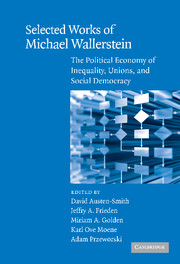 Selected Works of Michael Wallerstein
Selected Works of Michael Wallerstein Published online by Cambridge University Press: 27 January 2010
Introduction
Social democracy is, in essence, a series of political and economic compromises. Early social democrats were forced to compromise between their Marxist program and their commitment to abide by the rules of electoral competition that rendered the implementation of the Marxist program politically infeasible. Later, social democrats were forced to compromise between promoting the interests of their core constituency of manual workers in manufacturing, transportation, construction, and mining and the need to obtain support from much broader groups if they were to obtain a majority. Finally, social democracy represents a compromise between egalitarian goals and the need to promote economic growth and employment in a market economy driven by private investment.
Compromises are frequently unpopular. At the crest of left-wing mobilization in Europe and North America during the late 1960s and early 1970s, social democratic parties were denounced for having joined forces with their supposed class enemies in opposition to growing rank-and-file militancy. Defenders of social democracy on the Left responded by arguing that the apparent loss of social democracy's revolutionary aspirations was temporary. In the long run, a number of scholars argued, social democracy will be credited with creating the conditions that make the final transition from capitalism to socialism possible.
Today, the pendulum has swung the other way, and predictions of a radicalization of social democracy appear to be little more than wishful thinking. In the current climate, social democracy is charged with being already too radical for the good of the economy.
To save this book to your Kindle, first ensure [email protected] is added to your Approved Personal Document E-mail List under your Personal Document Settings on the Manage Your Content and Devices page of your Amazon account. Then enter the ‘name’ part of your Kindle email address below. Find out more about saving to your Kindle.
Note you can select to save to either the @free.kindle.com or @kindle.com variations. ‘@free.kindle.com’ emails are free but can only be saved to your device when it is connected to wi-fi. ‘@kindle.com’ emails can be delivered even when you are not connected to wi-fi, but note that service fees apply.
Find out more about the Kindle Personal Document Service.
To save content items to your account, please confirm that you agree to abide by our usage policies. If this is the first time you use this feature, you will be asked to authorise Cambridge Core to connect with your account. Find out more about saving content to Dropbox.
To save content items to your account, please confirm that you agree to abide by our usage policies. If this is the first time you use this feature, you will be asked to authorise Cambridge Core to connect with your account. Find out more about saving content to Google Drive.